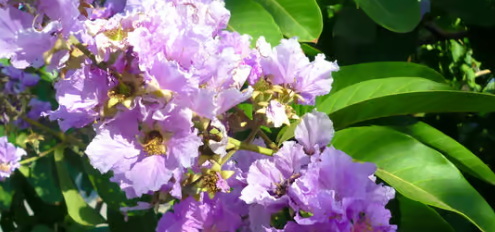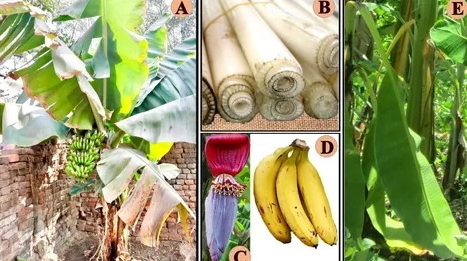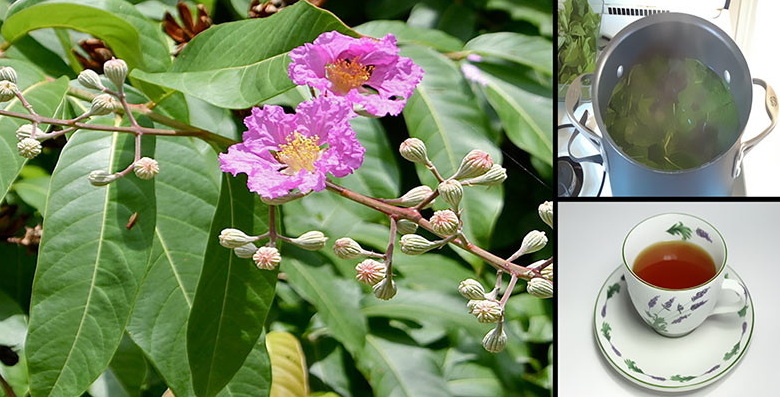Content Menu
● Introduction to Banaba Leaf Extract
>> Corosolic Acid and Its Role
● Scientific Evidence on Banaba Leaf Extract
>> Blood Sugar Regulation
>>> Study on Type 2 Diabetic Subjects
>> Cholesterol and Weight Management
>> Antioxidant and Anti-Obesity Effects
● Potential Health Benefits Beyond Diabetes
>> Anticancer Effects
>> Antibacterial and Antiviral Potential
>> Antithrombotic Effect
>> Protection Against Kidney Damage
● How to Use Banaba Leaf Extract
>> Preparation Methods
● Mechanisms of Action
● Safety and Side Effects
>> Interactions with Medications
● Future Research Directions
● Conclusion
● FAQ
>> 1. What are the primary health benefits of Banaba leaf extract?
>> 2. How does corosolic acid in Banaba leaves affect blood sugar levels?
>> 3. Can Banaba leaf extract be used alongside conventional diabetes treatments?
>> 4. What forms of Banaba leaf extract are available?
>> 5. Are there any known side effects of Banaba leaf extract?
● Citations:
Banaba leaf extract, derived from the Lagerstroemia speciosa tree, has been traditionally used in Southeast Asia for its medicinal properties, particularly in managing blood sugar levels. This article delves into the scientific evidence surrounding Banaba leaf extract, examining its effects on diabetes, cholesterol, weight management, and other potential health benefits.

Introduction to Banaba Leaf Extract
Banaba leaves contain over 40 bioactive compounds, with corosolic acid being one of the most significant components responsible for its health benefits. Corosolic acid is known to mimic insulin, facilitating the movement of glucose from the bloodstream into cells, which can help regulate blood sugar levels.
Corosolic Acid and Its Role
Corosolic acid is a key compound in Banaba leaves that has been shown to decrease blood sugar levels by enhancing glucose uptake in cells, impairing the hydrolysis of sucrose and starches, and reducing gluconeogenesis. It also exhibits antihyperlipidemic and antioxidant activities, contributing to improved lipid metabolism and reduced oxidative stress.
Scientific Evidence on Banaba Leaf Extract
Blood Sugar Regulation
Numerous studies have demonstrated that Banaba leaf extract can significantly reduce blood glucose levels in individuals with type 2 diabetes. For example, a study involving 15 subjects who received a water-soluble Banaba extract for one year showed a significant decrease in fasting blood glucose levels and improvements in glucose tolerance without causing hypoglycemia.
Study on Type 2 Diabetic Subjects
In another study, ten type 2 diabetic subjects were given a Banaba extract standardized to 1% corosolic acid for two weeks, resulting in a 30% decrease in blood glucose levels. However, it was unclear whether this effect was due to corosolic acid alone or a combination with other tannin components.
Cholesterol and Weight Management
Banaba leaf extract has also been linked to cholesterol reduction and weight management. A study involving mice on a high cholesterol diet showed that corosolic acid led to a 32% decrease in blood cholesterol and a 46% decrease in liver cholesterol levels. Additionally, a study in adults with impaired fasting glucose found that a combination of Banaba leaf and turmeric extracts reduced triglyceride levels by 35% and increased HDL cholesterol by 14%.
Antioxidant and Anti-Obesity Effects
Banaba leaves are rich in antioxidants, which help neutralize free radicals and protect against oxidative stress. This antioxidant activity may contribute to its anti-diabetic effects by protecting the pancreas from damage. Furthermore, Banaba leaf extract has been suggested to have anti-obesity properties, although more research is needed to confirm these effects.
Potential Health Benefits Beyond Diabetes
Anticancer Effects
Test-tube studies suggest that Banaba leaf extract may promote programmed cell death in certain cancer cells, indicating potential anticancer properties. However, these findings are preliminary and require further investigation.
Antibacterial and Antiviral Potential
Banaba leaf extract has shown potential in protecting against certain bacteria and viruses, although these effects have not been extensively studied in humans.
Antithrombotic Effect
There is some evidence suggesting that Banaba leaf extract may help dissolve blood clots, which could reduce the risk of high blood pressure and stroke.
Protection Against Kidney Damage
The antioxidants in Banaba leaf extract may offer protection against kidney damage caused by chemotherapy drugs.

How to Use Banaba Leaf Extract
Banaba leaf extract can be consumed as a tea, powder, or capsule. While there is no universally recommended dosage, one study suggested taking 32–48 mg of Banaba leaf extract capsules standardized to contain 1% corosolic acid for two weeks to reduce blood sugar levels.
Preparation Methods
- Tea: Dried Banaba leaves can be steeped in hot water to make a tea. This method allows for a more traditional approach to consuming the extract.
- Powder: Banaba leaf powder can be added to smoothies or other beverages for convenience.
- Capsules: Capsules provide a standardized dose of corosolic acid and are often preferred for their ease of use.
Mechanisms of Action
Banaba leaf extract works through several mechanisms to exert its health benefits:
1. Enhanced Glucose Uptake: Corosolic acid helps increase the uptake of glucose by cells, reducing blood sugar levels.
2. Inhibition of Gluconeogenesis: It reduces the production of glucose in the liver, further lowering blood glucose levels.
3. Antioxidant Activity: The antioxidants in Banaba leaves protect against oxidative stress, which can contribute to various diseases.
Safety and Side Effects
Most studies indicate that Banaba leaf extract is safe and does not cause significant side effects. However, it is always advisable to consult with a healthcare provider before starting any new supplement, especially if you are already on conventional diabetes medications.
Interactions with Medications
While Banaba leaf extract is generally considered safe, it may interact with certain medications, such as blood thinners or diabetes drugs. Therefore, it is crucial to monitor blood sugar levels closely if using Banaba leaf extract alongside conventional diabetes treatments.
Future Research Directions
Future studies should focus on:
1. Optimizing Dosage: Determining the optimal dosage for different health conditions.
2. Combination Therapies: Investigating the effectiveness of Banaba leaf extract when combined with other natural or conventional treatments.
3. Long-Term Effects: Conducting long-term studies to assess the sustainability of its health benefits.
Conclusion
Banaba leaf extract, particularly through its corosolic acid content, has shown promising effects in managing blood sugar levels, cholesterol, and weight. While more research is needed to fully understand its potential health benefits and optimal dosages, existing studies suggest that Banaba leaf extract could be a valuable adjunct in managing metabolic disorders.

FAQ
1. What are the primary health benefits of Banaba leaf extract?
Banaba leaf extract is primarily known for its ability to regulate blood sugar levels, reduce cholesterol, and provide antioxidant effects. It may also have anti-obesity and anticancer properties, though more research is needed to confirm these benefits.
2. How does corosolic acid in Banaba leaves affect blood sugar levels?
Corosolic acid mimics insulin by enhancing cellular glucose uptake, impairing the hydrolysis of sucrose and starches, and reducing gluconeogenesis, which helps lower blood glucose levels.
3. Can Banaba leaf extract be used alongside conventional diabetes treatments?
While Banaba leaf extract may be beneficial for blood sugar management, it should be used under medical supervision, especially if you are already on conventional diabetes medications, to avoid any potential interactions.
4. What forms of Banaba leaf extract are available?
Banaba leaf extract can be consumed as a tea, powder, or capsule. Capsules are often standardized to contain a specific percentage of corosolic acid.
5. Are there any known side effects of Banaba leaf extract?
Most studies indicate that Banaba leaf extract is safe and does not cause significant side effects. However, it is always advisable to consult with a healthcare provider before starting any new supplement.
Citations:
[1] https://pmc.ncbi.nlm.nih.gov/articles/PMC3468018/
[2] https://naturmedscientific.com/banaba-leaf/
[3] https://www.healthline.com/nutrition/banaba-leaf
[4] https://www.youtube.com/watch?v=pmG2dwtMZ6g
[5] https://pmc.ncbi.nlm.nih.gov/articles/PMC5067667/
[6] https://www.webmd.com/vitamins/ai/ingredientmono-1089/banaba
[7] https://www.youtube.com/watch?v=bksAiuRzAaY
[8] https://www.latimes.com/archives/la-xpm-2005-may-02-he-supp2-story.html
[9] https://pubmed.ncbi.nlm.nih.gov/22095937/
[10] https://www.youtube.com/watch?v=Z6dNsSxtcmc
[11] https://www.youtube.com/watch?v=1HMAfe9x4ko
[12] https://www.liebertpub.com/doi/pdfplus/10.1089/jmf.2021.0039
[13] https://esther-mall.com/blogs/news/effects-of-coleus-banaba-leaf-extract-from-blood-sugar-to-weight-control-3-benefits-of-banaba-leaf
[14] https://www.rxlist.com/supplements/banaba.htm
[15] https://www.rialpharma.it/en/banaba-leaf/
[16] https://www.verywellfit.com/the-benefits-of-banaba-89413
[17] https://stock.adobe.com/search?k=banaba
[18] https://www.lifeextension.com/vitamins-supplements/item21373/banaba-leaf
[19] https://www.walmart.com/ip/BANABA-LEAF-ORGANIC-BOTANICAL-EXTRACT-DIY-POWDER-RAW-NATURAL-ANTIOXIDANT-8-OZ/451765458






























